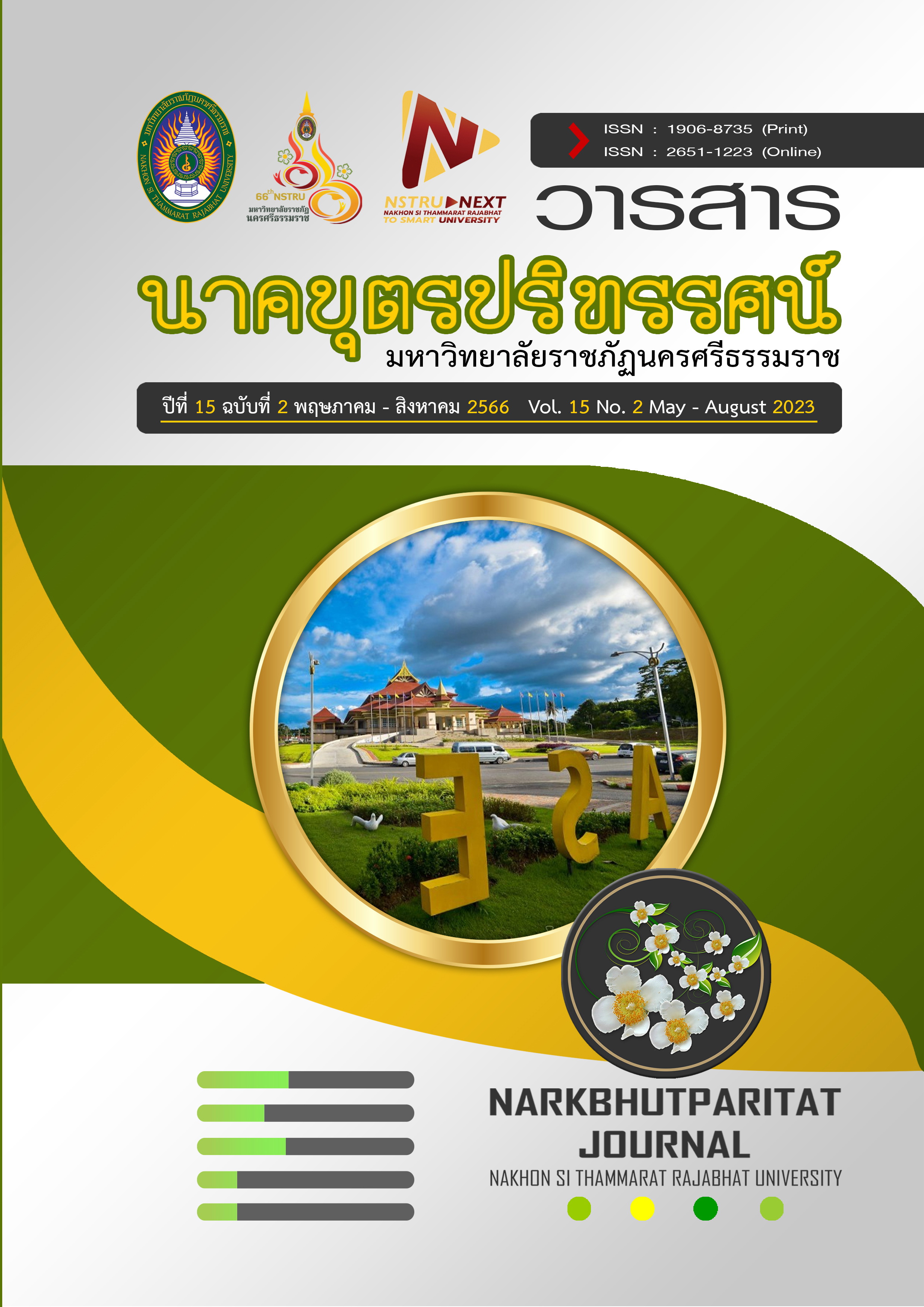การให้เหตุผลทางคณิตศาสตร์ของนักเรียน ในชั้นเรียนที่จัดการเรียนรู้แบบผสมผสานด้วยวิธีการแบบเปิด
Main Article Content
บทคัดย่อ
การวิจัยครั้งนี้มีวัตุประสงค์เพื่อวิเคราะห์การให้เหตุผลทางคณิตศาสตร์ของนักเรียนในชั้นเรียนที่จัดการเรียนรู้แบบผสมผสานด้วยวิธีการแบบเปิด ใช้ระเบียบวิธีการวิจัยเชิงคุณภาพโดยเน้นการสังเกตอย่างมีส่วนร่วม กลุ่มเป้าหมาย คือ นักเรียนชั้นประถมศึกษาปีที่ 2/2 ปีการศึกษา 2564 จำนวน 22 คน โรงเรียนเทศบาลวัดขจรรังสรรค์ จังหวัดภูเก็ต เครื่องมือที่ใช้ในการวิจัยครั้งนี้ ได้แก่ แผนการจัดการเรียนรู้แบบเปิด เรื่องการคูณ (1) จำนวน 6 แผน เครื่องบันทึกวิดีทัศน์ เครื่องบันทึกภาพนิ่ง เครื่องบันทึกเสียง และแบบบันทึกภาคสนาม เก็บรวบรวมข้อมูลในภาคเรียนที่ 2 ปีการศึกษา 2564 โดยบันทึกวีดิทัศน์ ภาพนิ่งและเสียงระหว่างการจัดการเรียนการสอนด้วยโปรแกรม Google Meet และเก็บรวบรวมผลงานของนักเรียนผ่านโปรแกรมไลน์ วิเคราะห์ข้อมูลโดยใช้การวิเคราะห์โปรโตคอล การวิเคราะห์เชิงเนื้อหาและการบรรยายเชิงวิเคราะห์ตามกรอบแนวคิดของ NCTM (2009)
ผลวิจัยพบว่า การให้เหตุผลทางคณิตศาสตร์ของนักเรียนในชั้นเรียนที่จัดการเรียนรู้แบบผสมผสานด้วยวิธีการแบบเปิด มี 4 อุปนิสัย ดังนี้ 1) อุปนิสัยการการวิเคราะห์ปัญหา นักเรียนมองเห็นแบบรูปของการเท่ากันของจำนวนในแต่ละกลุ่มแล้วนำมาเขียนเป็นประโยคสัญลักษณ์การคูณเป็นอุปนิสัยที่พบในทุกแผนการจัดการเรียนรู้ 2) อุปนิสัยการนำเครื่องมือหรือวิธีการไปใช้ในการแก้ปัญหา นักเรียนอธิบายและใช้วิธีการเรียนก่อนหน้ามาแก้ปัญหา 3) อุปนิสัยการเชื่อมโยงตัวแสดงแทนที่แตกต่างกัน นักเรียนแสดงแทนตัวเลขหรือรูปภาพด้วยบล็อก และ 4) อุปนิสัยการไตร่ตรองวิธีการแก้ปัญหาโดยพิจารณาความสมเหตุสมผล นักเรียนมีการถกเถียงหรือโต้แย้งในสิ่งที่ตนเองเข้าใจ และยอมรับหากสิ่งที่ตัวเองนำเสนอนั้นไม่ถูกต้อง
Article Details

อนุญาตภายใต้เงื่อนไข Creative Commons Attribution-NonCommercial-NoDerivatives 4.0 International License.
เอกสารอ้างอิง
Ball, D., & Bass, H. (2003). Making mathematics reasonable in school. In J. Kilpatrick, W. Martin, & D. Schifter (Eds.), A research companion to principles and standards for school mathematics (pp. 27–44). Reston, VA: NCTM.
Boaler, J. (2010). The road to reasoning. In K. Brodie (Ed.), Teaching mathematical reasoning in secondary school classrooms (pp. v–vii). New York: Springer.
Herbert, S. (2021). Overcoming Challenges in Assessing Mathematical Reasoning. Australian Journal of Teacher Education, 46(8). Doi: 10.14221/ajte.2021v46n8.2
Hjelte, Schindler & Nilsson, P. (2020). Kinds of mathematical reasoning addressed empirical research in mathematics education: A systematic review. Educ. Sci. 2020, 10(289).Doi: 10.3390/educsci10100289
Inprasitha, M. (2021). (2021, October 18-22). Online teaching and learning by using Lesson Study and Open Approach. Social Emotional Learning [Symposium]. EDUCA 2021 online festival. Bangkok. (in Thai)
Isoda, M. & Katagiri, S. (2012). Monograph on lesson study for teaching mathematics and science vol.1: Mathematical thinking: how to develop it in the classroom. Singapore: World Scientific Printers.
Kunseeda, P., Inprasitha, M., Changsri, N. & Sudjamnong, A. (2019) Students’ Speaking Skills in Mathematics Classroom Using Lesson Study and Open Approach. Creative Education, 10, 1702-1712. Doi: 10.4236/ce.2019.107121. (in Thai)
Manmai, T., Inprasitha, M. & Srichompoo, S. (2017). Students’ Mathematical Reasoning habit in Mathematics Classroom using Lesson Study and Open Approach [Paper presentation]. The 3rd Thailand Society of Mathematics Education Conference, Chiang Mai University. (in Thai)
Manmai, T., Inprasitha, M., Changsri, N. & Pattanajak, A. (2020). Development of Reasoning Habits Through Lesson Study and Open Approach Teaching Practices. International Educational Research, 3, 29-36. Doi: 10.30560/ier.v3n2p29 (in Thai)
National Council of Teachers of Mathematics. (2000). Principle and standards for school mathematics. Reston, VA: NCTM. (in Thai)
Office of The Education Council. (2020). Education in Thailand 2018. Bangkok: Prigwhan Graphic Co., Ltd. (in Thai)
Rathven, K. (1989). An exploratory approach to advanced mathematics. Educational Studies in Mathematics, 20, 449-467. Doi: 10.1007/BF00315610
Schoenfeld, A. H. (1992). Learning to think mathematically: Problem solving, metacognition, and sense making in mathematics. In D. A. Grouws (Ed.), Handbook of research on mathematics teaching and learning: A project of the National Council of Teachers of Mathematics (pp. 334–370). Macmillan Publishing Co, Inc.
Shulman, L.S. (1987). Knowledge & teaching: Foundations of the new reform. Harvard Educational Review, 57(1), 1-21.
The Institute for the Promotion of Teaching Science and Technology. (2019). PISA 2018 Reading Mathematics and Science. Retrieved from https://pisathailand.ipst.ac.th/pisa2018-fullreport. (in Thai)
Wetbunpot, K. & Inprasitha, N. (2015) Teacher’s Listening in Teaching Mathematics Using an Open Approach. Creative Education, 6, 1597-1602. Doi: 10.4236/ce.2015.614160. (in Thai)


